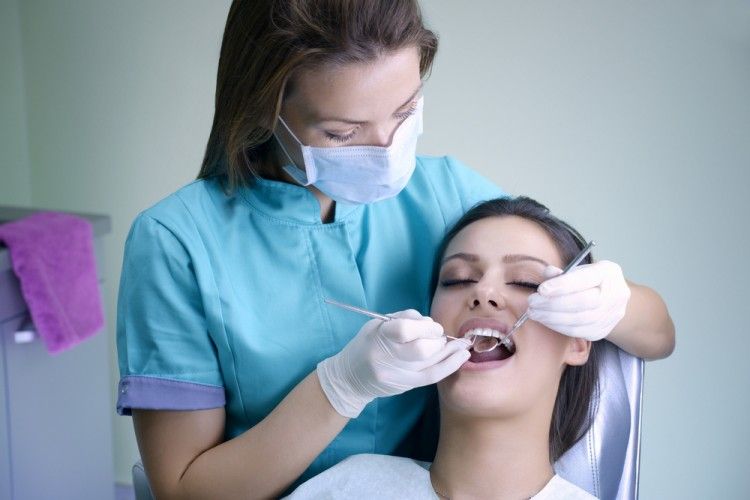- Best Practices New Normal
- Digital Dentistry
- Data Security
- Implants
- Catapult Education
- COVID-19
- Digital Imaging
- Laser Dentistry
- Restorative Dentistry
- Cosmetic Dentistry
- Periodontics
- Oral Care
- Evaluating Dental Materials
- Cement and Adhesives
- Equipment & Supplies
- Ergonomics
- Products
- Dentures
- Infection Control
- Orthodontics
- Technology
- Techniques
- Materials
- Emerging Research
- Pediatric Dentistry
- Endodontics
- Oral-Systemic Health
The Best Compensation Package for Hygienists
If you're paying your hygienists straight commission, are you also checking their periodontal charting? That's one of the first omissions when quantity takes precedence over quality in a straight commission arrangement. But it's not the only downside to this payment arrangement that has been gaining traction.

A high turnover rate for hygienists is detrimental to practice continuity.
How do you pay your hygienists?
While most hygienists still receive an hourly wage, there is considerable talk about hygienists being paid on straight commission. Dianne Watterson, a Lexington, North Carolina-based dental management consultant, says that while statistics indicate that only 7 to 8 percent of hygienists are paid straight commission, it has become a popular topic.
“There are pros and cons to both methods,” she says. “But it seems that more doctors are moving to straight commission pay.”
Regardless of trends, Watterson believes there are more negatives than positive when it comes to straight commission for hygienists.
WEIGHING PROS AND CONS
Watterson says that hygienists often make more money than any other staff member — and they should—due to their level of education and because they are producers. They generate revenue for the practice.
Where dentists become unhappy, however, is when they’re paying hygienists anywhere from $30 to $60 an hour, but there is no patient in the chair. That can prompt a dentist to consider a straight commission arrangement, which Watterson says is a great opportunity for hygienists to make exceptional wages.
“Hygienists have bills to pay too,” she points out.
A straight commission arrangement also gives hygienists the flexibility to leave during slower periods, and they receive a rise with every fee increase.
But, Watterson says, that arrangement becomes problematic when hygienists recognize that they don’t earn money if there is no patient in the chair. And that can have a negative ripple effect throughout the practice.
“I’ve been in offices where the hygienist, because she likes making that big take-home check, will sacrifice quality for quantity,” Watterson says. “Once they get used to that big take-home paycheck, it’s hard to back off and have a bad day or a bad week.”
Straight commission arrangements can also hinder teamwork. Dental offices employing multiple commissioned hygienists experience increased competition for patients, which can foster resentment.
“I’m not going to say that just because someone works fast they do poor work,” Watterson says. “But the fact of the matter is, when people are working very fast and they’re packing people in their schedule to see as many as possible, quality is going to suffer. The only way you’re going to correct it is if you start calling [the hygienist] on the carpet about her quality.”
CONSIDER A HYBRID
Watterson recommends a pay arrangement for hygienists consisting of base rate plus commission. She believes it protects the hygienist from those down times when there is no patient in the chair, yet incentivizes the hygienist to work efficiently.
“She’s not going to go home demoralized from getting commission on only two patients because she can be expected to do other peripheral duties in the office,” she explains. “They’re not productive things like chair-side duties are, but they’re necessary things, like sterilization, that need to be done as part of regular patient care.”
Because the best use of a hygienist’s time is being chair-side, Watterson says it’s incumbent on the practice’s front desk staff to keep the schedule full. Even though dentists are reticent about holding front desk staff responsible for the practice’s schedule, Watterson believes that’s something they need to do.
“The two main things that happen at the front desk are money and the schedule,” she says. “So somebody has to be held responsible for the schedule.”
STARTING POINT
If a dentist decides to utilize a base-plus-commission compensation arrangement, Watterson says the way to start is to go back six months with each hygienist, examine their production over that time, and determine what their average production is per day. Then you’re able to establish a production goal based on good data.
“Then, if the hygienist has a really good production day, it’s not going to hurt when she’s paid a commission for that great day,” Watterson says. “But if it’s straight commission and the practice doesn’t have a really efficient person at the front desk keeping the schedule full, hygienists will become real unhappy really quick when they have three or four bad production days in a row.”
That can prompt a hygienist to look for work elsewhere, and turnover is not good for practice continuity. That’s why, Watterson says, it’s critical for dentists to keep their thumb on the pulse of the practice. And the only way to do that is with good data.
“A lot of doctors kind of glaze over when you start talking numbers because they’re more interested in the clinical aspects of their work,” Watterson says. “But the fact of the matter is, the numbers don’t lie. If you’ve got good data, the numbers don’t lie.”
